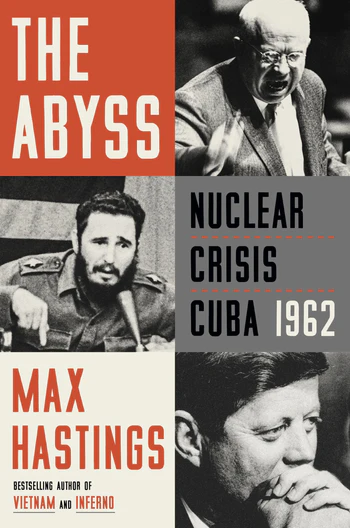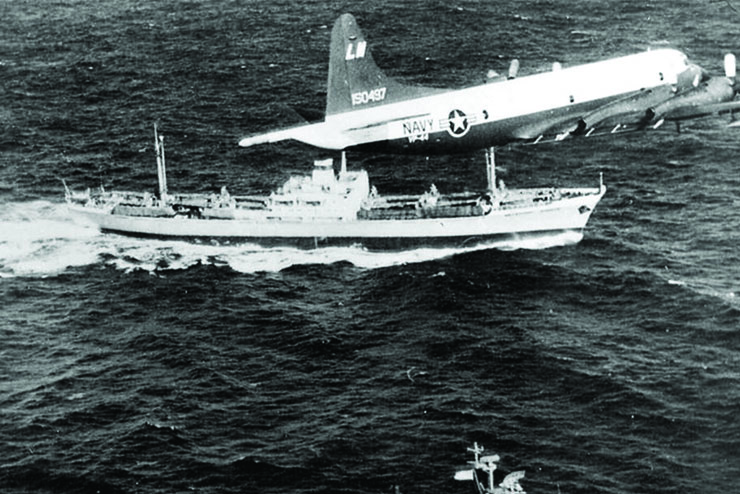
The Abyss: Nuclear Crisis Cuba 1962
by Max Hastings
HarperCollins
576 pp., $24.99
Max Hastings has never been a great historian. But his earlier works were at least adequate. He rarely strays from the path of orthodoxy—whatever that happens to be at the moment—and rarely uncovers a major previously unknown fact. And if he ever had an original insight, it died of loneliness. His writing is often diffuse, his books riddled with small errors. Despite his carelessness, he is at least not an ideologue or a liar, which nowadays is something to be grateful for. And he usually gets the tune right, even if he sometimes plays the wrong notes.
Regrettably, Hastings’ recent account of the Cuban Missile Crisis is a sharp drop from his previous middling standards. One of the few attractions of this bloated, tiresome book, which evades important issues while beating minor ones to death, is seeing what silly thing Hastings will write next.
One of the key flaws of The Abyss is its magnification of the danger of nuclear war during the public part of the Cuban Missile Crisis, after Kennedy had announced the discovery of Soviet missiles on the island on Oct. 22. Hastings’ motive in taking this dangerously exaggerated line is obviously to warn against underestimating the danger of nuclear war today. While one can sympathize as Russia and Ukraine teeter on the nuclear brink, it does not justify distorting an important historical event. Hastings’ other aim is even less praiseworthy—to keep alive and burnish the myth that Kennedy was a great president. Possibly even worse, he argues that Kennedy’s aides and the members of the “ExComm” group that supposedly guided decision making in the U.S. government handled the crisis brilliantly.
For Hastings, their poor performance in the Vietnam War should not obscure the advisors’ achievement in 1962. Kennedy’s brainy underlings—especially Secretary of Defense Robert McNamara and National Security Advisor McGeorge Bundy—really were “The Best and Brightest,” despite their missteps in Vietnam. To reach this conclusion, one must ignore the records of ExComm’s deliberations, much of which relate stories of errant blunderings, silly vaporings, and muddled reversals. The missile crisis’ actual handling mirrored the way these credentialed clowns mishandled the Indochinese mess, despite obvious dissimilarities.
Hastings is especially impressed by the “brilliance” of McNamara and Bundy. As Halberstam, Derek Leebaert, and others have noted, McNamara’s whole career was a fake. Bundy’s erratic performance in October 1962 worried President Kennedy, although not enough to fire him, as he should have. Bundy’s inept judgment was exemplified by his remark, on the 50th anniversary of Pearl Harbor that, ultimately, the attack benefitted both the U.S. and Japan, as it led to the victory that made lasting peace possible.
Hastings concedes that John Kennedy had some “large character flaws.” Nevertheless, he repeatedly slobbers over “one of the most enlightened men ever to occupy the White House.” This clichéd take on Kennedy sounds absurd given what we now know. A playboy, a congenital liar, and behind his charismatic mask, a weak and nasty individual with few real achievements to his credit, Kennedy comes off better than his countrymen in Hastings’ fawning depiction. (My frank assessment of Kennedy will be published in the November issue of this magazine.)
The Abyss is also cheapened by Hastings’ dismal and repetitive caricatures of Eisenhower, of the American military, and, especially, of American policies and actions in Cuba and Latin America. He portrays a Latin America oppressed by gringo military intervention and under the rule of evil dictatorships put in place by exploitative Yankees. Hastings would have you believe Latin America was a stronghold of democracy until the gringos arrived and imposed military dictatorships. He zeroes in on America’s supposedly egregious interference in the 1950s. Alas! In reality, the number of dictatorships in Latin America declined by two-thirds during Eisenhower’s presidency.
Cuba has a special place in Hastings’ erroneously sympathetic heart. He goes on and on about the evil impact of the United States there—at one point saying that the United States reduced the wretched Cubans to “servitude.” He admits, once or twice, that Cuba was better off than the rest of the Caribbean, without bothering to mention that it ranked as the fourth richest country in Latin America. After prolonged ranting about the American-imposed Platt Amendment, which authorized evil American intervention in Cuba, he then absurdly claims that its abrogation in 1934 made no difference. In fact, the amendment was never invoked after 1920.
In the Cuban political realm, Hastings claims the Eisenhower administration did not turn against Castro for sound reasons. Rather, Castro’s “relentless taunting” allegedly offended Ike and other overly sensitive U.S. politicians. Hastings later switches course by suggesting that Americans turned against Castro and decided to overthrow him because of his agrarian reform and nationalization of American property. However, he forgets that these expropriations occurred after the Eisenhower administration had turned against Castro because of his unmistakable hostility and alliance with the Soviets.
Unsurprisingly, Hastings revives the old leftist claim that Castro was “driven” into the arms of the Soviets by American enmity. This farcical misunderstanding overlooks Castro’s communist conversion as a student. Castro was actually a late Stalinist who did not join the Cuban Communist party, but only because he considered it a political dead end and despised its leaders. Those massive quibbles aside, Hastings says nothing nice about Castro’s rule or his conduct during the missile crisis. On the other hand, he never bothers to mention the slight problem of Castro’s attempts to spread his revolution to the rest of Latin America, aggressive actions at odds with the policies of both the United States and many struggling Latin American nations themselves.
Hastings has little respect for British Prime Minister Harold Macmillan, whom he portrays as a weak man. Hastings distorts his initial, temperate position on the crisis, perhaps because it doesn’t fit the hoary “Old World wisdom versus American trigger happiness” line popular with European commentators. At least at first, Macmillan, who knew Kennedy better than any other foreign leader, feared the president would do nothing about the missiles in Cuba and dreaded the consequences. In fact, that was indeed the president’s preference. Macmillan was not alone in this suspicion. Whatever they pretended in public, few of our allies’ leaders respected Kennedy, even if their people swallowed the Kennedy legend whole even more than gullible contemporary Americans did.
It comes as something of a relief that Hastings takes a fairly realistic view of Nikita Khrushchev. The Soviet leader’s relatively humane stance on domestic matters did not obscure his hard-line stance on foreign affairs. Yet, with Hastings, there is always a “but.” He cannot shake the old myth that Khrushchev was under pressure from leaders tougher than him. Contemporary historical research has shown that Khrushchev was in fact the most aggressive character in his government, pushing his positions often against the opposition of more cautious men. Hastings uncritically accepts Khrushchev’s explanation of his decision to send the missiles to Cuba as motivated by two aims—closing the gap in strategic weapons with the United States and deterring an invasion of Cuba.
Hastings insinuates an intended American invasion posed a real danger to Cuba even though his insinuation lacks scholarly clarity. His failure to flesh out this accusation weakens his argument. While it might have been reasonable for the Soviets and Cubans to fear an American invasion, there is good reason to believe that they did not harbor any such concerns. Their intelligence services advised both Khrushchev and Castro that no such risk existed. At one point Khrushchev remarked that if the Americans were to attempt an invasion of Cuba, they would probably try to time it to help JFK’s reelection, which was then two years away. Curiously, Khrushchev briefly came to fear an invasion of Cuba after the buildup was underway. But he soon realized that he had erred. And as other Soviet leaders had warned, strategic weapons in Cuba would more likely trigger the danger of invasion, not avert it.
That leaves the “strategic” explanation as the basis of Khrushchev’s actions, which to Hastings is only a piece of irrationality on the part of the Soviet leader and his military advisers. What did they intend to do when the buildup was complete and the missiles were found or revealed? Either they had no idea, which is unlikely, to put it mildly, or they had a plan that has never come to light. As usual, Hastings is trapped by his own assumptions and his reluctance to explore unpleasant possibilities. He refuses to deal with the question of the military impact of the missiles. He quotes McNamara’s assessment that this oversight did not change anything. He notes that the Joint Chiefs of Staff disagreed, but he never asks why. He does not mention the relevant point that the Cuban missiles outflanked the American warning system. As if that’s not enough, he doesn’t seem to care what they were aimed at.
Hastings’ simplifying assumptions and lack of curiosity lead to the comforting conclusion that the missiles posed merely a political threat, not a life-or-death strategic one. Hastings thinks most Americans, if not JFK himself, were hysterical during the crisis. Angry and determined—more determined than JFK himself—would be a more accurate description of the common attitude. Hastings condescendingly and ahistorically informs us that American overreaction, not an existential crisis, was the real menace. Believe that if you can.
(This article is from the November 2023 print edition of Chronicles.)

Leave a Reply